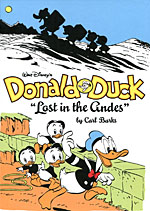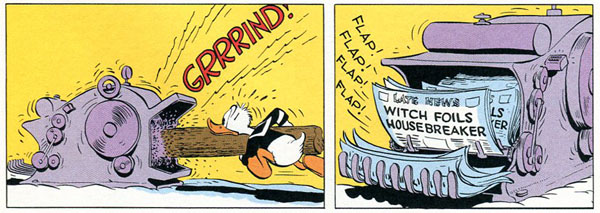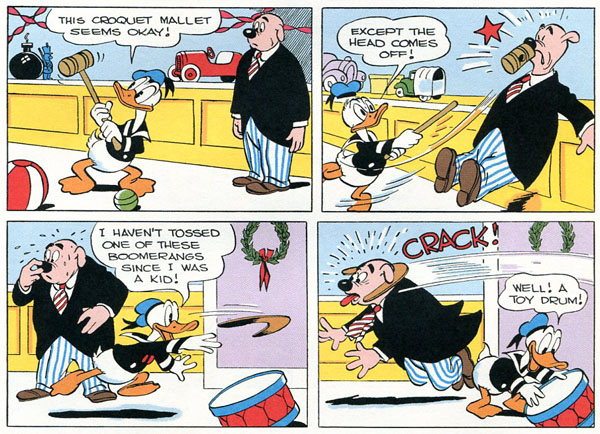 By Carl Barks
By Carl Barks
240 pages, color
Published by Fantagraphics
Carl Barks is one of those comic creators that, up until now, I’d never read anything by. And as a long-time comic reader, that’s been a secret shame. Barks is, after all, one of the original three inductees into the Comic Book Hall of Fame (along with Will Eisner and Jack Kirby), and his comics for Disney made him a superstar across the world. Well, everywhere except for America, it seems. Here, his creations have been occasionally collected, but also quickly falling out of print and never making a huge splash. Fantagraphics is now giving Barks’ Duck comics a whirl, and based off this first volume alone if there’s any justice in the comics world, fame should finally (belatedly) be coming for the late, great Barks.
Donald Duck: Lost in the Andes isn’t chronologically the first of Barks’ Duck comics, with Fantagraphics (wisely) jumping ahead about half a dozen years to when Barks had hit his stride and started turning out stories that are touted as Barks in his prime. (At the end of the collection process, they’ll go back and issue those earliest, reportedly weaker stories.) So when I sat down with Donald Duck: Lost in the Andes, I was bracing myself to have my socks knocked off. And I’ll admit it: at first, I wasn’t as enthralled as I’d expected. The opening story ("Lost in the Andes!") initially felt a little rambling and aimless, as Donald, Huey, Dewey, and Louie wander South America trying to find where chickens that lay square eggs come from. But just as I was starting to get around the halfway point and the Ducks were in the hidden Incan city, I began to realize something: I couldn’t stop reading.
What I’d initially mistaken for a lackadaisical storytelling technique turned out to be a much more classic method; Barks is carefully planting material to be mined in the later moments of the story. More importantly, though, is that you need to have a slightly different mind set for reading Donald Duck: Lost in the Andes. Essentially, you need to let go of looking for a large structured story, and instead just lean back and enjoy the sheer fun of it all. And once you do that? Well, Donald Duck: Lost in the Andes begins to fire on all cylinders.

Donald Duck: Lost in the Andes is divided up into three sections based on story length; Adventures, Short Stories, and Gags. The four adventures stories (each in the 30-32 page range) are all fun, although it’s "The Golden Christmas Tree" that was easily my favorite. There’s something wonderfully strange about a story involving an evil witch wanting to wipe out all Christmas trees in the world by using a spell powered by "tears of disappointment." There’s a moment where Donald is trying to break into the witch’s cabin by using a log as a battering ram, and the witch conjures up a mulcher that not only shreds the log, but spits out newspapers on the back with the headline, "Late News: Witch Foils Housebreaker." It’s a moment where you can’t help but laugh, and the further you make it into Donald Duck: Lost in the Andes, the more full of these bits of cleverness that you’ll encounter. It’s also interesting to contrast the villain of that piece with the one in "Voodoo Hoodoo," a bad stereotype of a witch doctor named Foola Zoola. Unlike the witch, Foola Zoola has genuinely been wronged, and in the end nothing bad happens to him; the Ducks merely manage to escape before vengeance is (unfairly) delivered on them.
The shorts and gags are well worth reading, too. I was especially excited to read "The Sunken Yacht," a story in which Donald and his nephews raise a sunken ship by pumping it full of ping-pong balls. It’s a technique that was actually used years later, inspired by this very comic, and turned out to work well and kept the ship from disintegrating as it rose. Life imitating art is one thing, but this is clearly a case of life imitating genius. The shorts don’t have the same epic quality as the adventures, but Barks is able to stuff them full of good jokes and clever twists, often placing Donald and his nephews at odds in classic games of one-upsmanship. Even the one-page gag strips are worth a chuckle or two, Barks zooming directly to the punch line.

The reproduction on these strips are beautiful; Fantagraphics hired cartoonist Rich Tommaso to re-color the works, and Tommaso wisely uses gentle flat tones to keep with the overall feel of Barks’ crisp, classic art. I also appreciated the essays about the different stories in the back of the book. Fantagraphics did the same thing with their recent Mickey Mouse books, and once again it feels like we’re getting all sorts of DVD extras included here. Donald Duck: Lost in the Andes is a handsome looking book, and trust me when I say it’s just the first of many I plan on reading by Barks. It may have taken me several decades to finally read Barks’ comics, but I’m not waiting that long for another helping. I’ll be reading these as fast as Fantagraphics can publish them.
Purchase Links: Amazon.com | Powell’s Books

One Reply to “Donald Duck: Lost in the Andes”
Comments are closed.